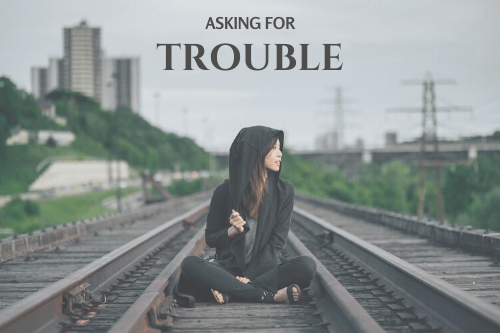
YouTube / iTunes / Spotify / Radio Public / Pocket Casts / Google Podcasts / Breaker / Overcast
Listen to ArtisanEnglish.jp posts & lesson intros here.
English Phrase: Asking for trouble
Sometimes, the things we do are nothing but asking for trouble.
To be asking for trouble means to be doing something that is going to get you into trouble.
Often, it’s something stupid and foolish.
Whether it’s intentional or not, we humans are often our own worst enemies.
I can’t explain to you why we do these things that will cause us problems, but we do.
Unfortunately, it has nothing to do with age.
Yes, it may seem like young people are more prone to doing stupid things and getting themselves into trouble.
However, I don’t think there’s a positive correlation between age and taking actions that are asking for trouble.
Take the situation of a middle-aged man speeding on the highway.
Now, he’s probably been driving for more than 25 years.
He can see the posted speed limit, and he is aware that if caught, he will receive a hefty ticket and be docked a few points as well.
Yet, he does speed, does get caught, receives a ticket and loses points.
Why?
Well, perhaps breaking the rules a little bit and asking for trouble is kind of exciting.
Of course, he feels stupid if caught but invigorated if he gets away with it.
Just like the young woman in the above picture, everyone knows you should not play on the train tracks.
It’s a perilous and foolish thing to do.
Yet, there she is, sitting on the tracks as cool as a cucumber as if it’s nothing.
Then she took a picture, too.
That’s doubly asking for trouble.
You know, and I know the police check Facebook to catch stupid people posting photos and videos of themselves doing foolish things.
One, she’s asking for trouble just by being on the tracks, and two, she’s again tempting fate by photographing it.
Come to think of it, I hope I don’t get her in trouble.
But then again, she’s asking for trouble.
Flesch-Kincaid Readability Test
This post is understandable by someone with at least a 7th-grade education (age 12).
On the Flesch-Kincaid reading-ease test, this post scores 78.
The higher the score on a scale of 0 – 100, the easier the passage is to read.

